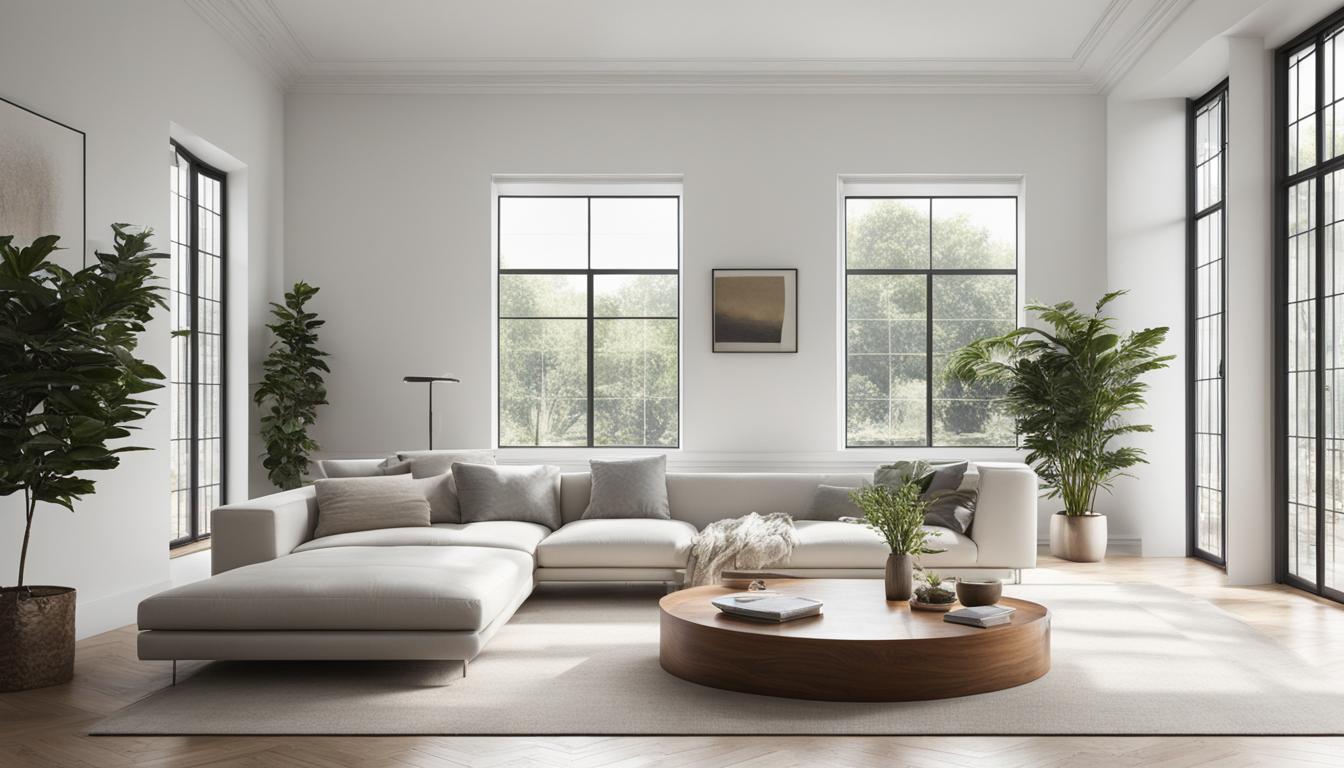Minimalism is more than just living with the things you need. It is centered around removing distractions and focusing on what is important. The concept of minimalism originated in the 50s and 60s and has since evolved to encompass all aspects of life. Minimalism promotes freedom from material possessions and helps put things in perspective in our fast-paced, connected world.
Key Takeaways:
- Minimalism is about removing distractions and focusing on what is important.
- It originated in the 50s and 60s and has evolved to encompass all aspects of life.
- Minimalism promotes freedom from material possessions.
- Minimalism helps put things in perspective in our fast-paced, connected world.
- Embracing minimalism can lead to a more intentional and fulfilling life.
The Benefits of Minimalism
Embracing a minimalist mindset offers a range of benefits that can greatly enhance our lives. By choosing to live with less and simplify our surroundings, we can experience a greater sense of peace, clarity, and contentment.
Simple living allows us to focus on what truly matters by reducing the distractions and clutter that often overwhelm us. With fewer possessions, we have more time and mental space to devote to our passions, relationships, and personal growth.
A minimalist mindset also helps us manage our time and resources more effectively. By eliminating excessive consumption and prioritizing our needs over wants, we can free ourselves from the endless cycle of materialistic desires. This, in turn, creates a greater sense of financial stability and security.
The Benefits of Minimalism:
- A less cluttered and more organized living space
- Reduced stress and overwhelm
- Increased focus and clarity
- Better time and money management
“Minimalism is not about deprivation; it’s about creating space in our lives for what truly matters.” – Unknown
Living with less also encourages us to be more intentional in our choices. Rather than accumulating possessions for the sake of it, we learn to value quality over quantity. We surround ourselves with items that truly bring us joy and serve a purpose, letting go of the rest.
Ultimately, the benefits of minimalism extend beyond our immediate surroundings. They ripple into our mindset, shaping how we approach life and our relationships. By embracing a minimalist lifestyle, we can design a life that is filled with meaning, purpose, and fulfillment.
Finding Freedom through Minimalism
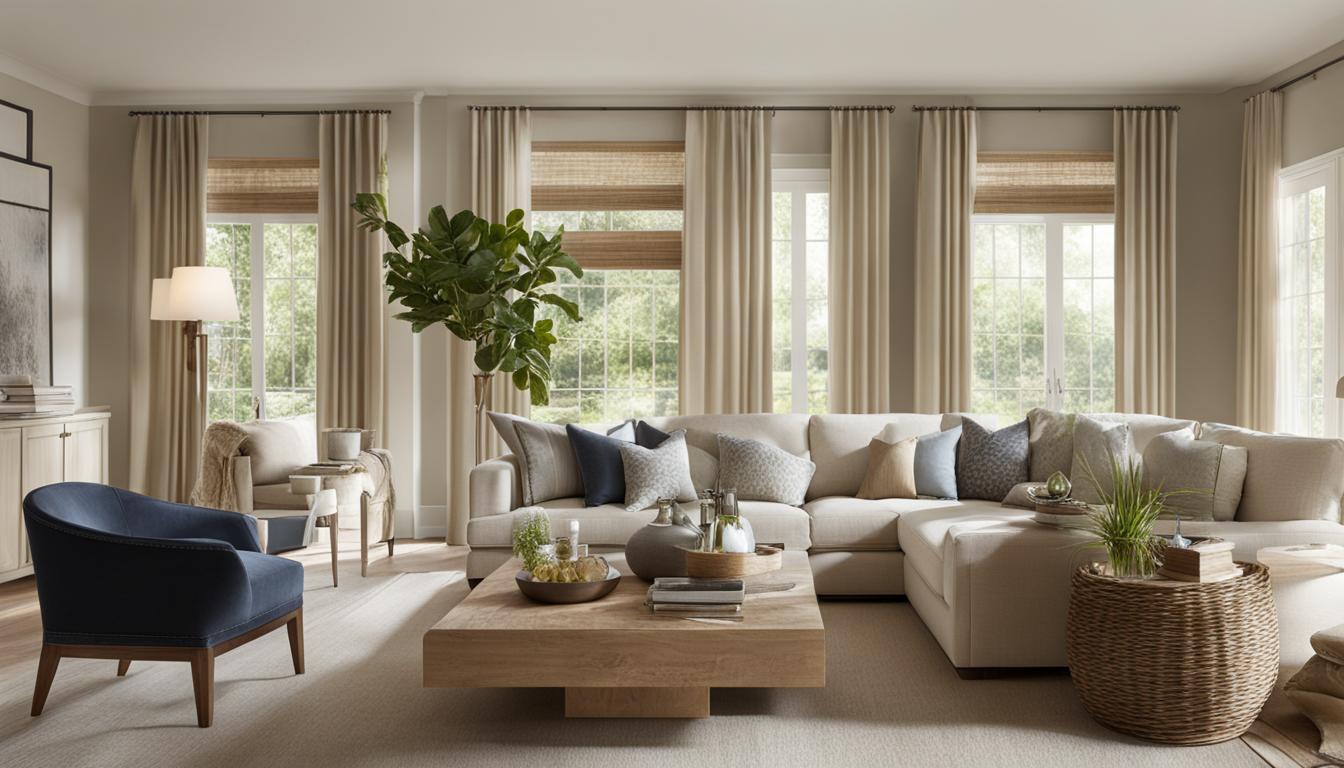
Minimalism offers more than just a clutter-free living space—it provides freedom from the need to possess and accumulate material possessions. By embracing minimalism, individuals can experience a shift in perspective and find a sense of liberation from the weight of possessions.
One of the key principles of minimalism is mindfulness. It encourages us to be aware of the impact our belongings have on our lives and to question whether they truly bring value and joy. This mindful approach helps us prioritize what is truly important, freeing us from the constant desire for more and allowing us to focus on the things that truly matter.
Minimalism also offers a counterbalance to the fast-paced nature of modern life. It encourages us to slow down, take a step back, and appreciate the present moment. By simplifying our surroundings and removing distractions, we create a peaceful and decluttered environment that fosters a sense of calm and contentment. A minimalist home promotes a sense of tranquility and allows us to fully relax and recharge.
The Minimalist Lifestyle as a Practice
Embracing a minimalist lifestyle is not just about decluttering your physical space, it is a journey and a practice that extends to various aspects of life. For those new to minimalism, it involves evaluating what is truly important and eliminating distractions that hinder our focus and well-being.
Minimalism for beginners:
- Start by decluttering your physical space, getting rid of items you haven’t used in months or years.
- Focus on quality over quantity when it comes to your belongings.
- Choose versatile pieces that bring joy and serve a purpose in your life.
But minimalism goes beyond material possessions. It challenges us to simplify our routines, relationships, and commitments. By embracing a minimalist mindset, we can create a more intentional and fulfilling life.
“Minimalism is the intentional promotion of the things we most value and the removal of anything that distracts us from it.” – Joshua Becker
Building a Minimalist Wardrobe
A minimalist wardrobe is an essential part of the minimalist lifestyle. It focuses on curating a collection of clothing that is versatile, high-quality, and aligned with your personal style.
Here are some tips for creating a minimalist wardrobe:
- Assess your current wardrobe and donate or sell items that no longer serve you.
- Invest in timeless and classic pieces that can be mixed and matched.
- Choose quality over quantity and prioritize sustainable and ethical fashion brands.
By streamlining your wardrobe, you not only reduce decision fatigue but also simplify your daily routine and create a sense of ease and clarity in your life.
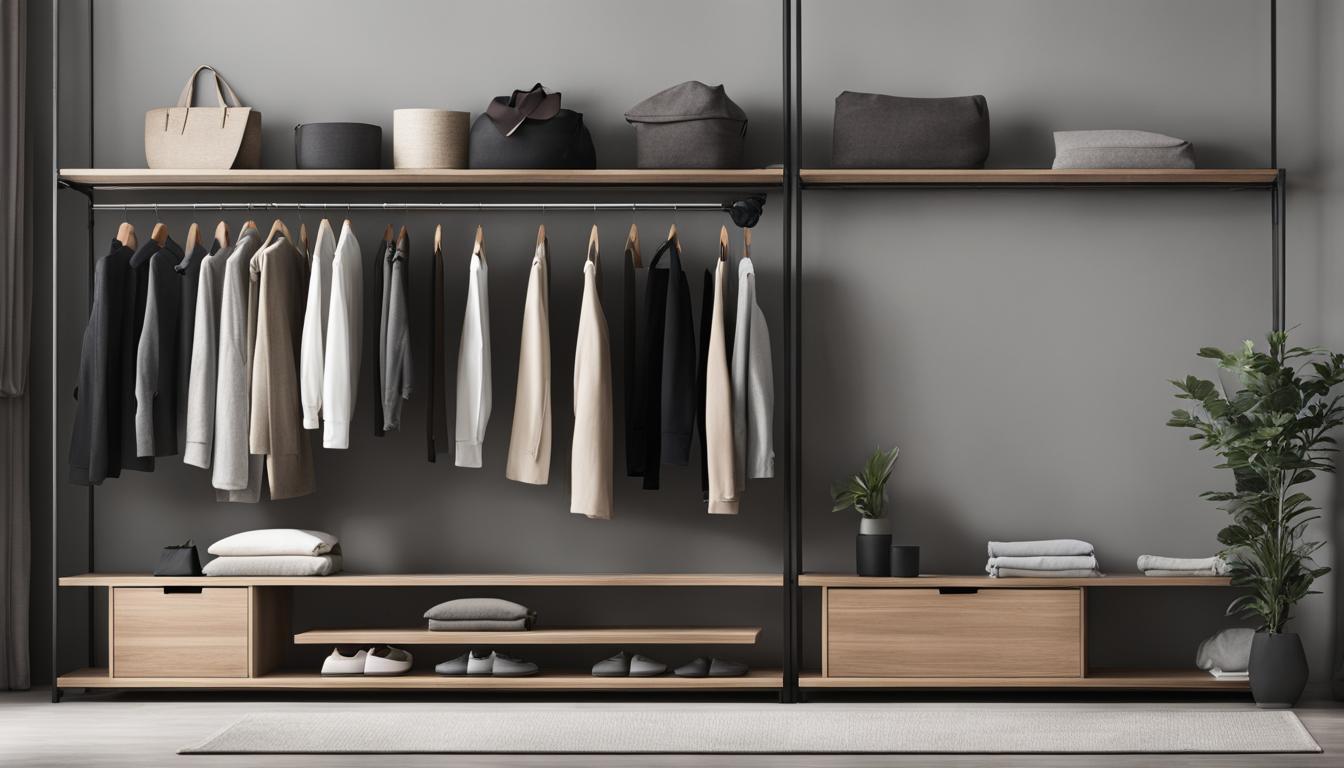
Minimalism as Aesthetics – Interior Design
In addition to being a lifestyle choice, minimalism is also an aesthetic approach to interior design. It is characterized by clean lines, simplicity, and functionality. Minimalist homes have uncluttered spaces, monochromatic color schemes, and a focus on essential furnishings. This minimalist interior design promotes a sense of calm and simplicity, creating a harmonious and visually appealing living environment.
A minimalist home is all about creating a space that is free from unnecessary distractions. By eliminating clutter and simplifying the overall design, you can establish a serene and peaceful atmosphere. The minimalist approach encourages you to carefully select each piece of furniture and decor, ensuring that they serve a purpose and bring you joy.
Minimalism embraces the concept of “less is more,” allowing you to appreciate the beauty of simplicity. By removing excess details and keeping only what is essential, you can enhance the visual impact of your space. This intentional design philosophy creates a clean and uncluttered aesthetic, making your home feel more organized and spacious.
Creating a Minimalist Home
If you want to incorporate minimalist interior design into your home, here are a few key principles to keep in mind:
- Declutter: Start by decluttering your space and removing any unnecessary items. Only keep what you truly need and cherish.
- Simple color palette: Choose a monochromatic or neutral color scheme to create a sense of harmony and calmness.
- Functional furniture: Opt for furniture that is both stylish and practical, with clean lines and minimal ornamentation.
- Clear surfaces: Keep surfaces clear of unnecessary items, allowing each piece to stand out and contribute to the overall aesthetic.
- Organized storage: Utilize smart storage solutions to keep your belongings hidden and maintain a clutter-free environment.
By following these principles, you can transform your home into a minimalist sanctuary that promotes tranquility and simplicity. Embracing the minimalist aesthetic in your interior design choices will not only enhance the visual appeal of your space but also inspire a more minimalist mindset in your overall lifestyle.
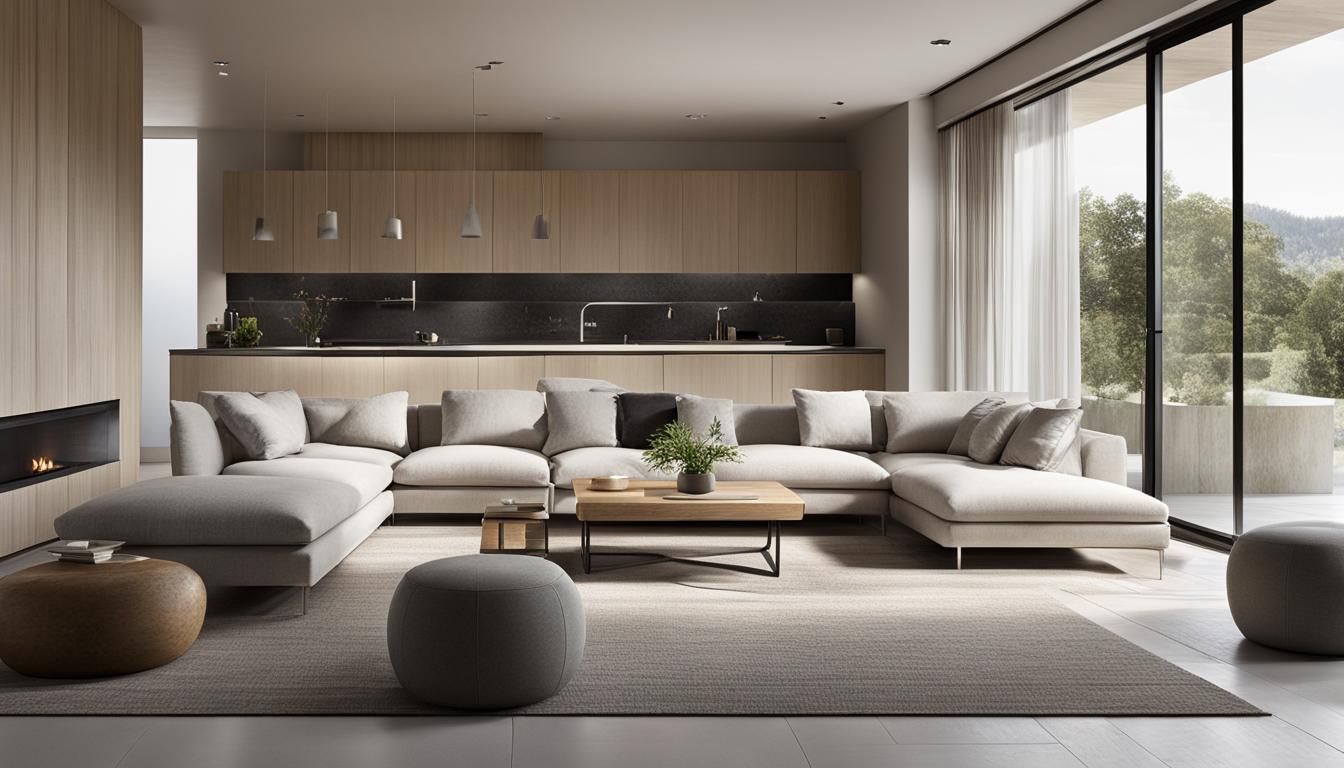
First Steps to Minimizing Your Home
Decluttering your home is the first step towards embracing a minimalist lifestyle. By removing unnecessary items and organizing your living space, you can create a more peaceful and balanced environment. Here are some practical tips to help you get started:
- Set aside dedicated time: Schedule a specific time to declutter your home. This will help you stay focused and committed to the process.
- Tackle one area at a time: Start with a small space, such as a drawer or a shelf, and work your way through each area of your home. Breaking it down into smaller tasks will make the process more manageable.
- Sort into categories: Create separate piles for items you want to keep, donate, sell, or discard. This will help you make clear decisions and avoid keeping things you no longer need.
- Be mindful of sentimental items: Sentimental items can be challenging to part with, but it’s important to evaluate their true significance in your life. Keep only those that truly hold meaning for you.
- Organize and optimize storage: Once you have decluttered, focus on organizing your belongings in a way that maximizes space and makes them easily accessible. Use storage solutions that align with your minimalist goals.
Creating a clutter-free environment
Regularly cleaning and organizing your home is key to maintaining a minimalist living space. Here are some additional tips to help you create a clutter-free environment:
- Adopt a “one in, one out” rule: For every new item you bring into your home, remove one item. This will prevent unnecessary accumulation and help you maintain a balanced and clutter-free space.
- Minimize paper clutter: Go digital whenever possible to reduce the amount of paper clutter in your home. Scan important documents and store them digitally, and unsubscribe from unnecessary mail.
- Establish a cleaning routine: Regularly clean and dust your home to keep it looking and feeling fresh. A tidy space promotes a sense of calm and contributes to a more peaceful mindset.
- Create designated spaces: Assign specific areas for different activities and belongings. This will help you maintain organization and prevent clutter from spreading throughout your home.
By taking these first steps towards minimizing your home, you will be well on your way to embracing the principles of minimalism and creating a living environment that promotes simplicity and tranquility.
The Concept of Minimalism
Minimalism is more than just a trend; it is a way of life that promotes simplicity, intentionality, and freedom. At its core, minimalism is about owning fewer possessions and intentionally living with only what you truly need. By removing the excess from our lives, we create space for what truly matters.
Minimalism is not just about decluttering our physical spaces; it extends to all aspects of our lives. It encourages us to evaluate our priorities and eliminate distractions that do not align with our values. Minimalism is a counter-cultural approach to consumerism, where the focus shifts from acquiring material possessions to seeking fulfillment and contentment.
The principles of minimalist living are centered around clarity, purpose, and intentionality. It is about finding freedom from the desire to possess and accumulating possessions. Minimalism invites us to question our attachment to material things and to focus on experiences, relationships, and personal growth.
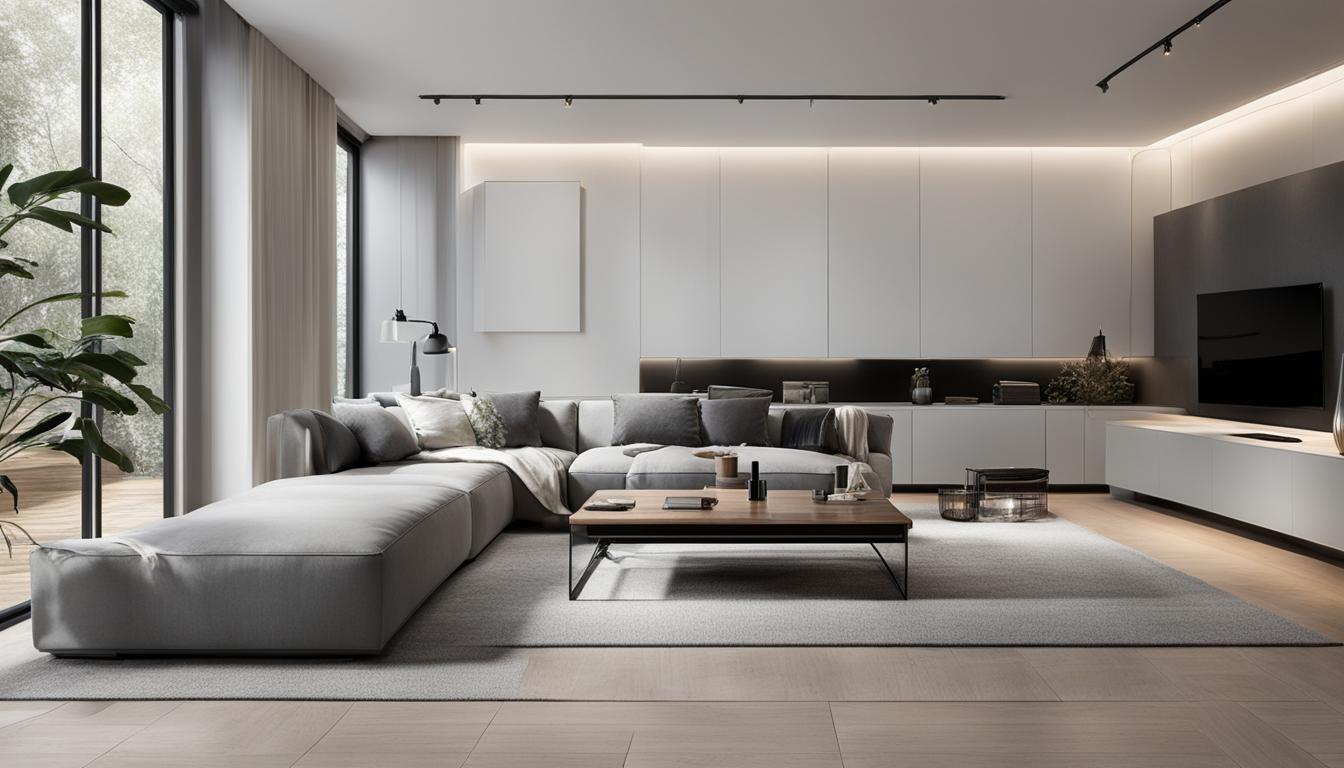
Key Principles of Minimalist Living:
- Intentionality: It involves being conscious and deliberate in our choices, ensuring that they align with our values and priorities.
- Simplicity: Simplifying our lives by eliminating the non-essential allows us to focus on what truly matters.
- Contentment: Finding satisfaction and fulfillment in what we already have rather than constantly seeking more.
- Mindfulness: Being present and aware of our thoughts, actions, and surroundings, cultivating a deeper sense of appreciation for the present moment.
- Quality over quantity: Prioritizing well-made, long-lasting items over a multitude of cheap and disposable possessions.
“Minimalism is not about having less; it’s about making room for more of what matters.”
By embracing the concept of minimalism, we can simplify our lives, reduce stress, and find greater fulfillment. Minimalist living is an ongoing journey that requires introspection, conscious decision-making, and a commitment to prioritizing what truly matters. It is about designing a life that aligns with our values and brings us joy and contentment.
Minimalism as a Counter-Cultural Lifestyle
In a world obsessed with consumption and material possessions, minimalism offers a refreshing alternative – a counter-cultural lifestyle that challenges the status quo. Embracing intentional living and prioritizing what truly matters, minimalists reject the notion that happiness can be found in the accumulation of things. Instead, they focus on simplicity, authenticity, and purpose.
Minimalism invites individuals to question societal norms and redefine their relationship with material possessions. It encourages a shift from the constant desire for more to a contentment with less. By consciously choosing to live with intention, minimalists free themselves from the pressures and demands of society, creating space for personal growth, fulfillment, and greater connection with what truly matters in life.
“Minimalism is not about deprivation, but rather about understanding what truly brings value and joy to our lives.”
The Power of Intentional Living
At the core of minimalism is intentional living. It is about mindfully choosing how we spend our time, energy, and resources. By eliminating excess and focusing on what aligns with our values and passions, minimalism helps us create a life that is more purposeful and meaningful.
- Decluttering: Minimalism starts with decluttering our physical space, letting go of things that no longer serve a purpose or bring us joy. This process frees up mental and physical space, reducing distractions and making room for what truly matters.
- Prioritizing Experiences: Minimalism encourages us to prioritize experiences and relationships over material possessions. By redirecting our focus to meaningful experiences and human connections, we cultivate a fuller and more satisfying life.
- Authenticity: Embracing a minimalist lifestyle allows us to live in alignment with our authentic selves. It liberates us from the pressure to conform to societal expectations and encourages us to pursue what truly brings us happiness and fulfillment.
Minimalism as a counter-cultural lifestyle empowers individuals to break free from the cycle of consumerism and embrace a simpler, more intentional way of living. It is a journey of self-discovery, where we learn to appreciate the beauty of less and find contentment in the present moment.
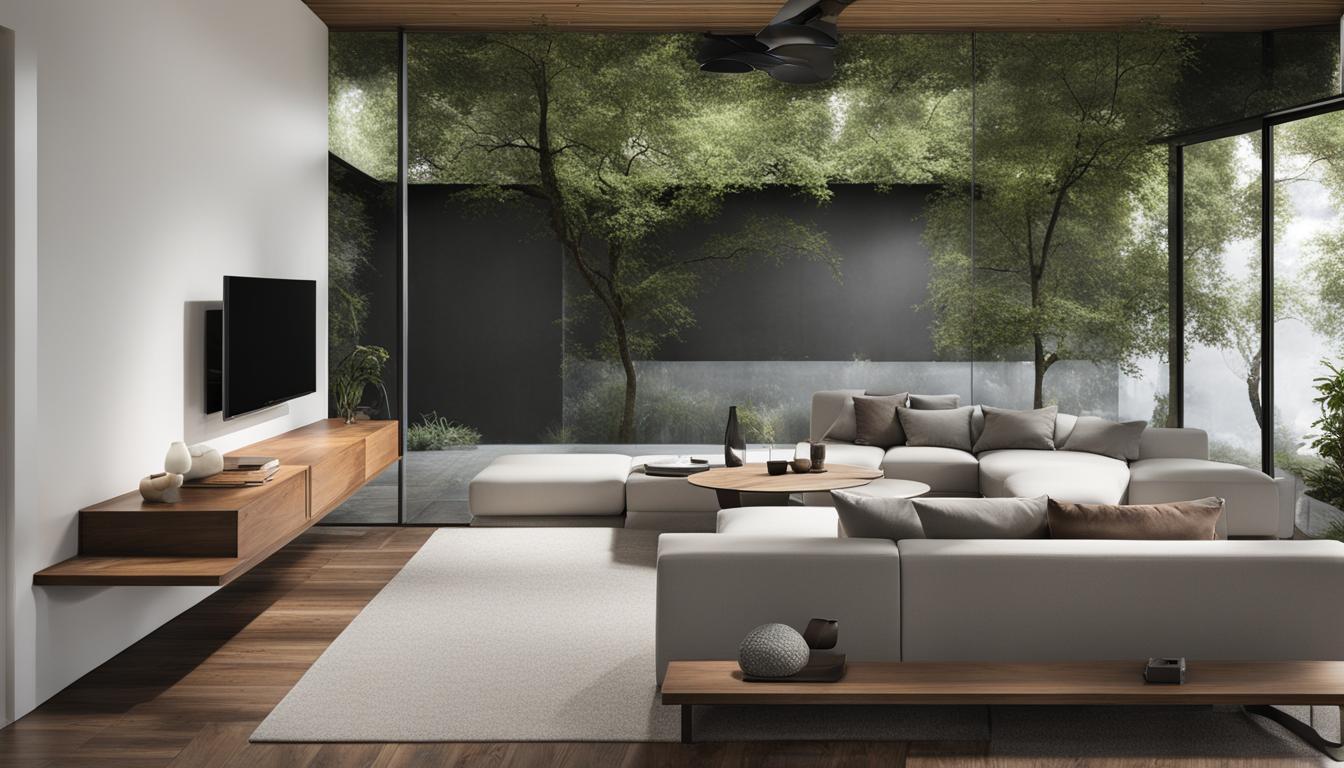
Conclusion
Minimalism is more than just a lifestyle; it is a mindset that can greatly enhance our modern living. By embracing minimalism, individuals can experience the many benefits it offers, including reduced stress, clutter-free living spaces, increased focus, and a sense of freedom.
Living a minimalist lifestyle involves consciously choosing to live with less and focusing on what truly matters. It encourages us to prioritize experiences, relationships, and personal growth over material possessions. By eliminating distractions and unnecessary clutter, we can create a more intentional and meaningful way of living.
Incorporating minimalist principles into various aspects of life, such as decluttering our homes, organizing our belongings, and adopting a minimalist mindset, can lead to a greater sense of contentment and overall well-being. By simplifying our lives and focusing on what brings us joy and purpose, we can create a more balanced and fulfilling lifestyle.
Whether you are just beginning your minimalist journey or have been practicing minimalism for years, remember that it is a continuous process. Be patient with yourself as you navigate the challenges and embrace the rewards of minimalist living. By prioritizing what truly matters and living with intention, you can create a more meaningful and fulfilling life.
FAQ
What is minimalism?
Minimalism is more than just living with the things you need. It is centered around removing distractions and focusing on what is important. It promotes freedom from material possessions and helps put things in perspective in our fast-paced, connected world.
When did minimalism originate?
The concept of minimalism originated in the 50s and 60s and has since evolved to encompass all aspects of life.
What are the benefits of minimalism?
Minimalism offers numerous benefits, including a less cluttered and more organized living space, reduced stress and overwhelm, increased focus and clarity, and better time and money management. It encourages a shift in mindset towards prioritizing experiences and relationships over material possessions.
How does minimalism provide freedom?
Minimalism provides freedom from the need to possess and accumulate material possessions. It encourages mindfulness and awareness of the impact our belongings have on our lives. Minimalism also helps to put things into perspective and slow down the fast-paced nature of modern life.
How do I start embracing minimalism?
Adopting a minimalist lifestyle is a journey and a practice. It starts with decluttering and simplifying your physical space, but it extends beyond that to other areas of life. Minimalism for beginners involves evaluating what is truly important and eliminating distractions.
What is minimalist interior design?
Minimalism is not only a lifestyle but also an aesthetic approach to interior design. It embraces clean lines, simplicity, and functionality. Minimalist homes feature uncluttered spaces, monochromatic color schemes, and a focus on essential furnishings.
How do I declutter my home?
The first step to embracing minimalism is decluttering your home. Start by getting rid of items you haven’t used in months or years, and only keep things that bring you joy or serve a purpose. Regularly clean and organize your home to maintain a minimalist living space.
What is the concept of minimalism?
Minimalism is about owning fewer possessions and intentionally living with only what you truly need. It emphasizes clarity, purpose, and intentionality. Minimalism is a tool to rid yourself of life’s excess and focus on what’s important.
Why is minimalism considered counter-cultural?
Minimalism goes against the grain of modern consumer culture. It challenges the belief that happiness can be found in accumulating possessions and strives for a simpler, more intentional way of living. Minimalists reject duplicity and seek authenticity in all aspects of life.
What are the benefits of minimalism in modern living?
Minimalism is a powerful tool for simplifying and enhancing modern living. It offers a range of benefits, from reduced stress and clutter to increased focus and freedom. Embracing minimalism as a lifestyle and incorporating its principles into various aspects of life can lead to greater contentment, fulfillment, and overall well-being.

